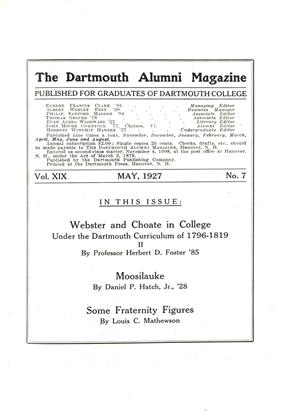(Of The Boston Globe)
Has Pres. Ernest M. Hopkins of Dartmouth started something towards reducing the emphasis on intercollegiate football?
He hopes he has. Otherwise, he would not, after a study of the last few years, have submitted to the Dartmouth Athletic Council the suggestions announced yesterday.
The writer believes that Pres. Hopkins is looking far ahead, and that, through his suggestions, he is sending word to advocates of football to watch their step to "stop, look and listen."
There has been such keen interest in football, so much clamor in every community where there is a big game every Fall that the educators have felt that something must be done.
It is often felt in certain quarters that football is the biggest thing in college life, and it is this that Pres. Hopkins is trying to eliminate. This is why he has come out in such strong terms in his suggestions to the Dartmouth Athletic Council.
Pres. Hopkins is a big man. He likes football, and there is no doubt in the writer's mind but what he wants it continued, but what he is aiming at is to get a happy medium, something that will minimize the human cry for a successful football eleven, above everything else, at college.
The Dartmouth president speaks of having two teams, playing home and home games the same days. That would be well and fine, but there is no doubt in the mind of followers of football that one team would be better than the other and naturally would attract all the color, as at present.
At what is Pres. Hopkins aiming? The writer feels that he desires to preserve the game, otherwise he would not have invited criticism from the experts, old football men and in fact anyone who will help in minimizing the turmoil that surrounds a contest between rival colleges.
He suggests that seniors do the coaching of the varsity squad made up of sophomores and juniors, which might or might not work out well, but the writer cannot see wherein such a plan would be worth while. Colleges demand the best professors in the study room.
It is hard to see how a senior, barred from playing football,. could be asked to use the time thus saved to coaching the sport. This much is certain, the coaching would not be very high class.
However, Pres. Hopkins has started something. He wants advice and criticism and unlike many college heads, he wants the game kept, not eliminated as some of the educators of the country have urged. The plan is one worth while considering, and whether it gets far only time will tell.
A big cry went up many years ago when the colleges decided to bar graduate students from sport teams. "How could the football teams get along without them?" was asked. Time proved that it could be done.
Later came the freshman rule, barring firstyear students from varsity competition. Another protest was made, but today there are few colleges in the country which allows freshmen to participate in varsity athletics.
Whether or not one agrees* with the suggestions presented by Pres. Hopkins, he certainly has offered some points which are worth trying out.
The attack on proselyting by the "athletic alumnus" anxious to see his college succeed in football carries much weight. There are other things which might be, brought up under this head, such as a student who might obtain his degree in June, but, having another year of eligibility for football, remains in college until the following February.
There are many cases where a boy, who has made up his mind about which college to attend, is persuaded by some interested alumnus of another college to shift his plans. This is doubtless one of the features which Pres. Hopkins had in mind in his reference to proselyting.
The more one studies and analyzes Pres. Hopkins' suggestions the more he sees good in some of them. The writer is not heartily in accord with his viewpoint, but if there comes out of his suggestions something that will preserve the game of football, all will be well.
Pres. Hopkins wants football retained but whether his plans accomplish what he is aiming at, is something that time only can tell.
It was back some years ago that someone said that football was "over commercialized," and later someone hit on the game being "over emphasized," and it is this what Pres. Hopkins wants to curb.
 View Full Issue
View Full Issue
More From This Issue
-
 Article
ArticleWEBSTER AND CHOATE IN COLLEGE
May 1927 By Herbert Darling Foster '85 -
 Article
ArticleTHE UNDERGRADUATE CHAIR
May 1927 -
 Article
ArticleMOOSILAUKE
May 1927 By Daniel P. Hatch, Jr. '28 -
 Article
ArticleSOME FRATERNITY FIGURES
May 1927 By Louis C. Mathewson -
 Article
ArticleDARTMOUTH STUDENTS SAID TO BE IRRELIGIOUS
May 1927 -
 Class Notes
Class NotesClass of 1921
May 1927 By Herrick Brown
Article
-
 Article
ArticleEx-Coach Honored
December 1941 -
 Article
ArticleNylon Researcher Ends Du Pont Career
January 1950 -
 Article
ArticlePOTATOES
May 1917 By "DESBOROUGH -
 Article
ArticleTuck School
February 1955 By A. W. FREY T'21 -
 Article
ArticleHanover Browsing
October 1940 By HERBERT F. WEST '22 -
 Article
ArticleMUSIC, DRAMA, AND FANTASIA
FEBRUARY 1994 By Professor Steven Paul Scher


